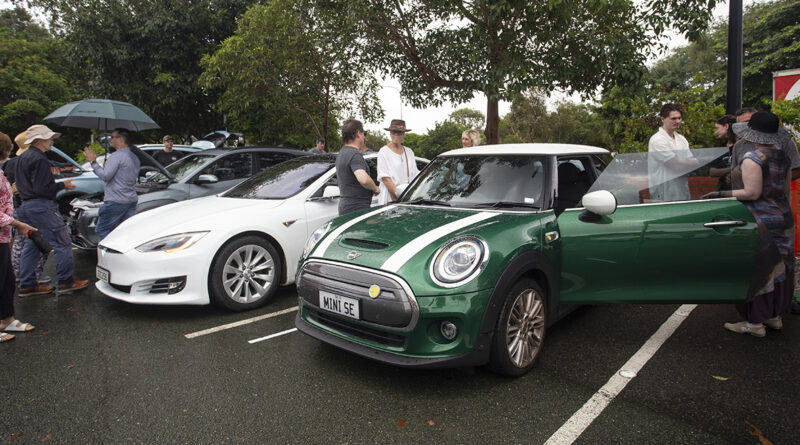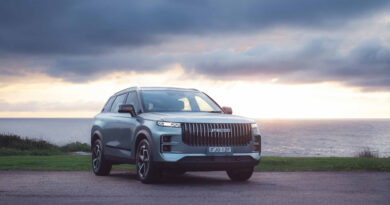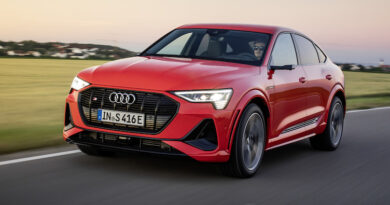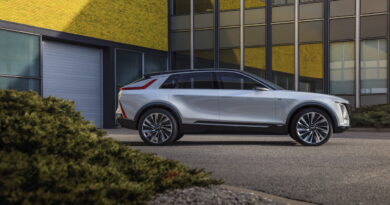Huge public interest as Noosa hosts electric vehicle expo
Tesla. Another Tesla. Hyundai Kona Electric. Jaguar iPace. A box-fresh Porsche Taycan. Then another Kona following a Tesla. Have I been teleported to Norway?
These were all spotted on my short drive to Noosa’s 2021 EV Expo, where it appeared every second car was a full electric vehicle. Optimistically thinking, this was a brief snapshot into the very near future of our roads.
I’ve attended this Sunshine Coast event each year since its 2018 inception (it was cancelled last year due to Covid), and while the public interest and attendance has always been there – helped by it being a free event – the difference this year was the number of people turning up in their own paid for and lived-in EVs.
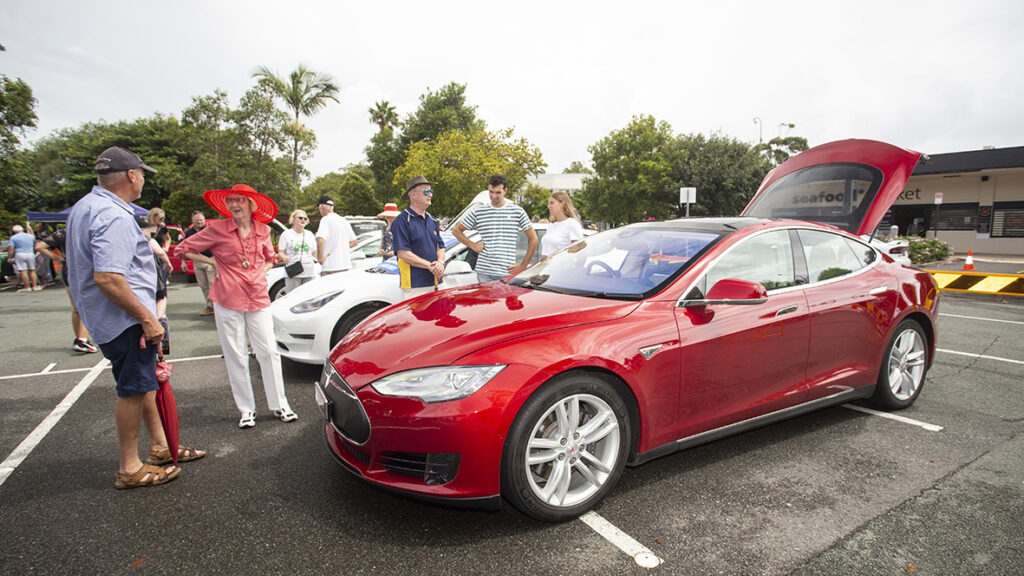
These cars, ever increasingly, look more mainstream and no longer fascinating novelties. Perhaps of little surprise, street-parked Tesla Model 3s were as prolific as Toyota Camrys at a suburban bowls club.
Organised by Zero Emissions Noosa – a not-for-profit with the goal of zero Noosa community greenhouse gas emissions by 2026 – the Expo is a showcase for sustainable transport. That includes buses, cars, motorbikes, e-scooters, e-bicycles and more.
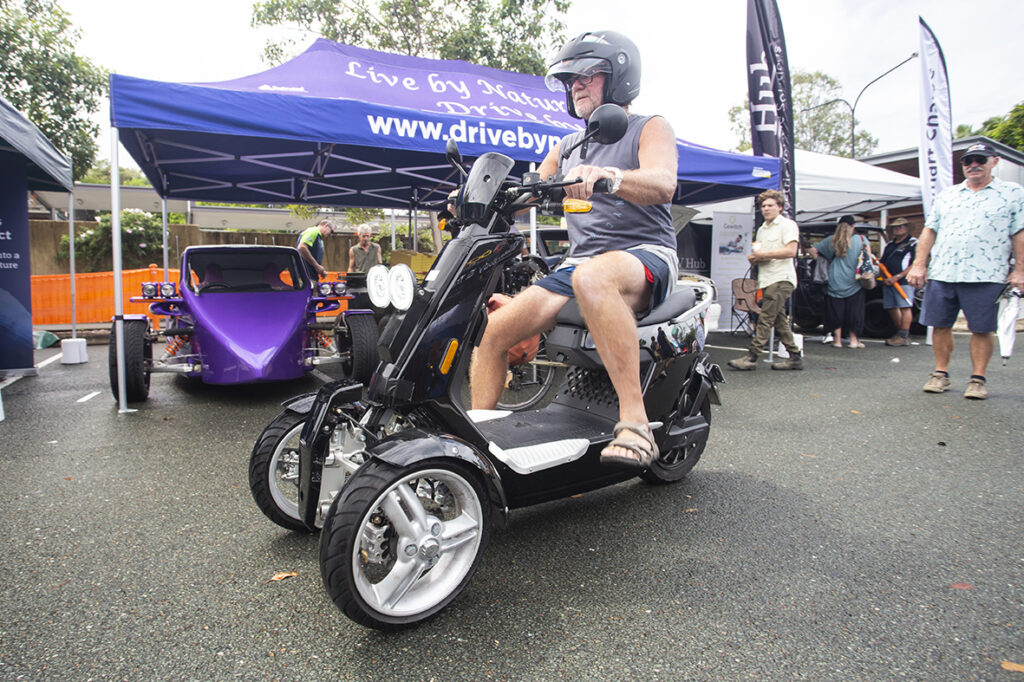
The organisation has partnered with Noosa Council and the local Noosa Junction Business Association for the event, and the Expo being opened by Queensland Minister for Transport and Main Roads, Mark Bailey MP, showed the support for such EV initiatives, especially an EV transition for public transport and fleet vehicles.
A key takeaway for me was how owners showcasing their private electric cars were so heavily besieged with questions.
The usual, really. How much? How far? How long to charge? How’s it drive? All I spoke to were doing great PR for their EVs, waxing lyrical about their brilliance and how they’d never go back to a ‘normal’ car.
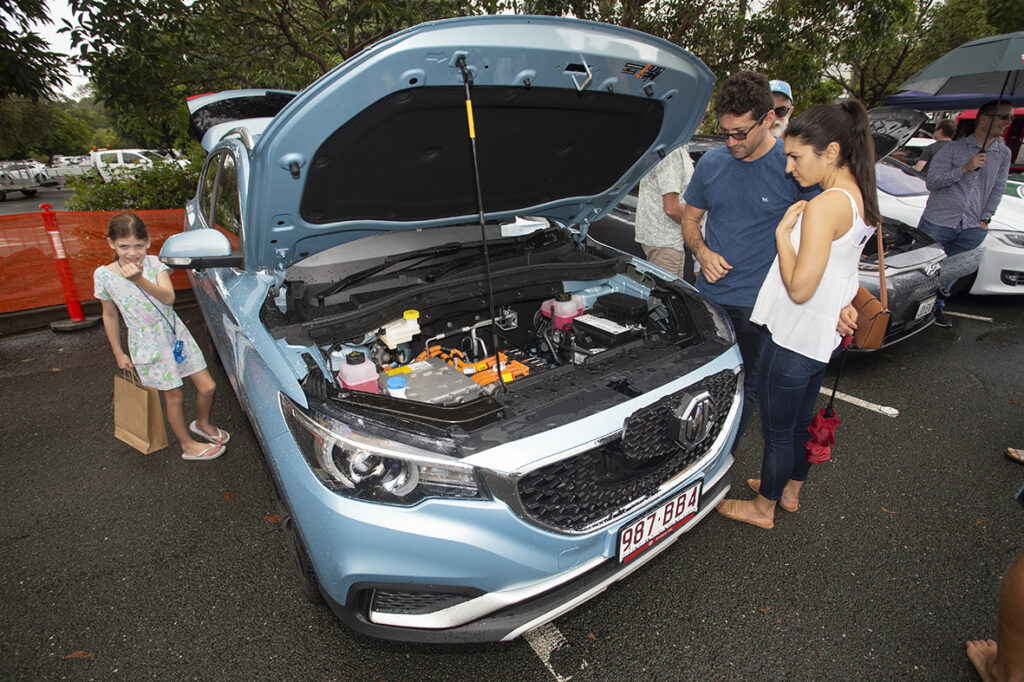
To their credit, owners of Tesla Model 3s, Models Ss, Hyundai Kona Electrics, a Mini Electric and an MG ZS EV worked hard over four hours to share their experiences. For those procrastinating if an electric will be their next purchase, hearing such feedback must be invaluable.
It was a shame, Mitsubishi Outlander PHEV aside, there were no plug-in hybrid cars on show for those only keen on flirting with this electrified middle-ground.
On the commercial side, Yutong Australia showcased its full-electric E12 low-floor city bus. Fresh from trials around the country, four of these 44-seaters are set to begin operating for Brisbane City Council, undertaking the city’s free loop service. This is due to start in July.
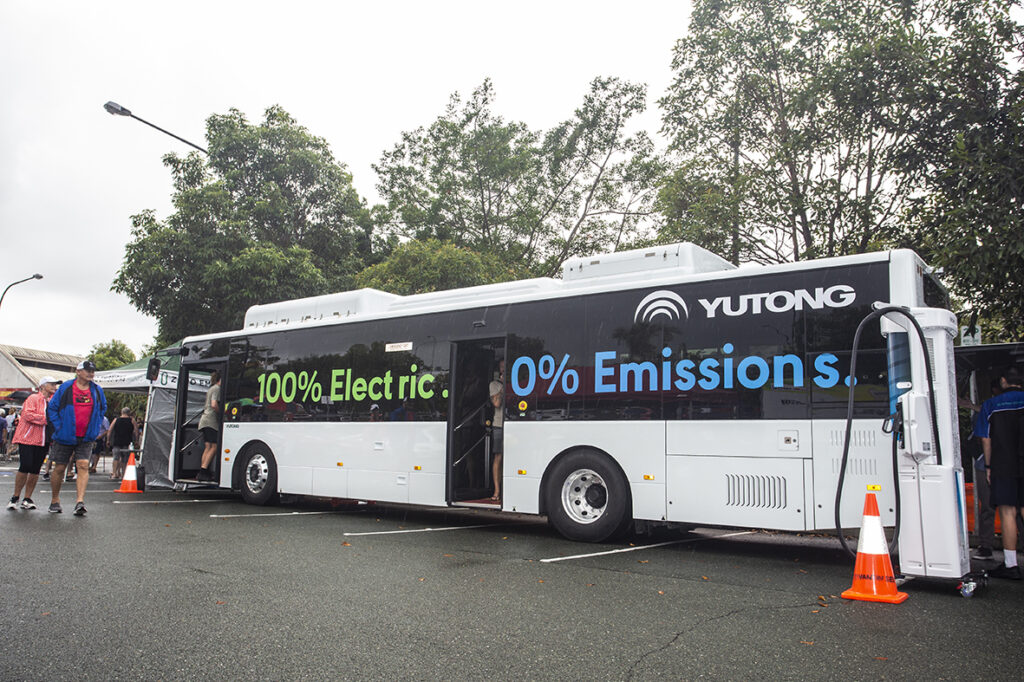
Andrew Shuttleworth from Yutong Australia told EVcentral the bus on show has a 374kWh battery pack good for approximately 400-kilometres on a single charge. “This one (on show) is $650,000 and available commercially. The ones we’re bringing into Queensland are 350kWh and can do a complete day service before heading back to the depot for a night charge. It can charge in two to eight hours depending on the charging capacity of the depot.”
Various styles of e-bikes were showcased, while brave souls could sample e-scooters and e-mobility devices on a very wet short test course.
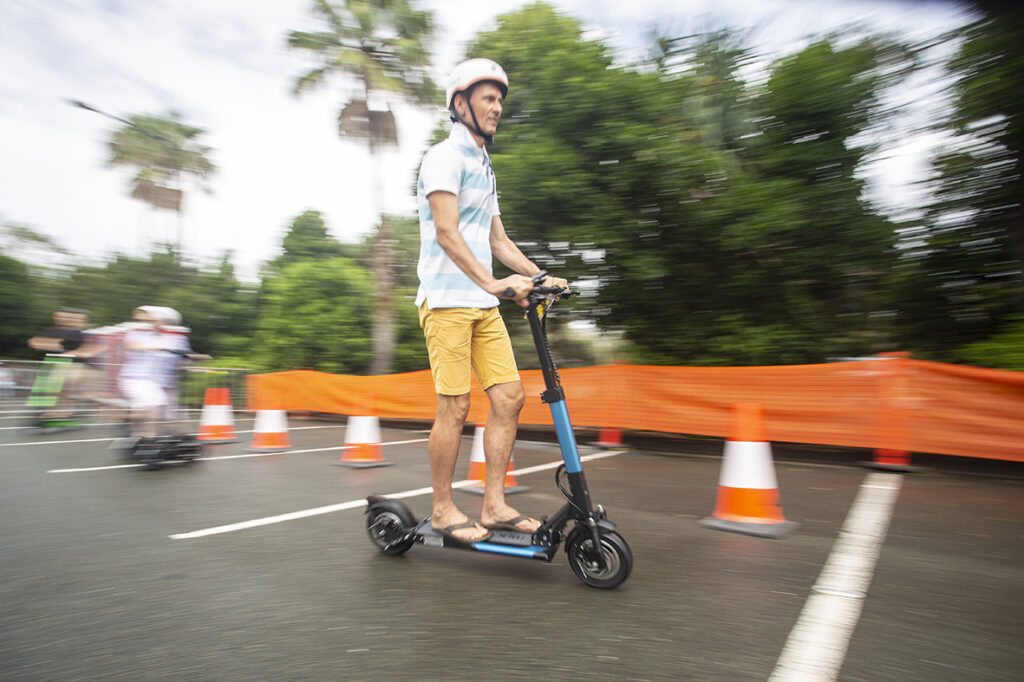
Brilliant to see was Sunshine Coast’s Matthew Flinders Anglican College in the process of an electric vehicle conversion project – a first for an Australian school. Part of the College’s Senior Industrial Technology Skills’ ATAR assessment for Year 12 students, the school has bought an old long-wheelbase Land Rover Defender for conversion to electric power. Bet your school never did anything quite so forward-thinking.
The College is using components bought from Queensland’s Traction EV, the highly-regarded electric conversion company we featured last year. James Pauly from Traction EV said he was offering the College technical support through the conversion, made easier with James almost completing a similar job on a 1974 Series 3 SWB Land Rover Defender.
“I’m just fitting components back into it now,” he said. “All the design and fabrications are complete, so it’s just a matter of bolting it all up and connecting it all together.”
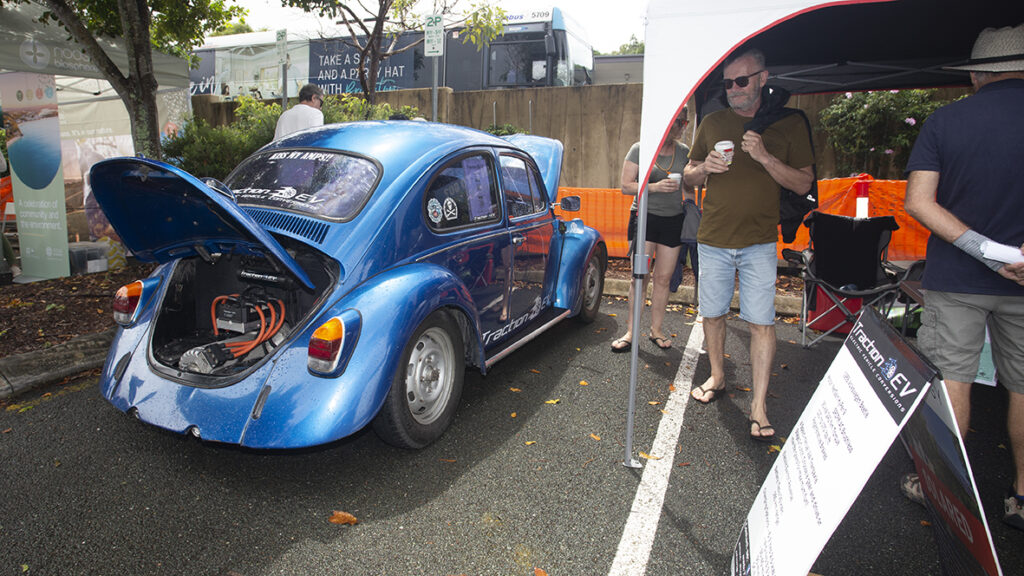
James brought his electric conversion 1968 VW Beetle to showcase his work, and was fielding questions almost non-stop. “I’ve had so many enquiries about the conversions we do,” he said. “There’s always more and more classic car enthusiasts asking about conversions. I had someone asking about converting his old Monaro. Only recently has there been enough performance on offer from electric to get the muscle car guys excited. They see what is possible now.”
With Traction EV’s workshop already booked out for the rest of the year, it’s clear the open-wallet enthusiasm for such conversions is high. James said his biggest issue right now was battery supply, which has become increasingly difficult due to Covid supply chain issues.
And how about just about the cheapest almost brand new EV you can buy? Local Chris Barclay showed his 2015 Mitsubishi Minicab MiEV, a tiny and lightweight commercial van complete with 16kWh battery and a range of around 100-kilometres. It was ordered by the Japanese Post Office but never used, sold at auction with 35-kilometres on the clock, and Chris had it landed in Australia for a total cost of $18,000.
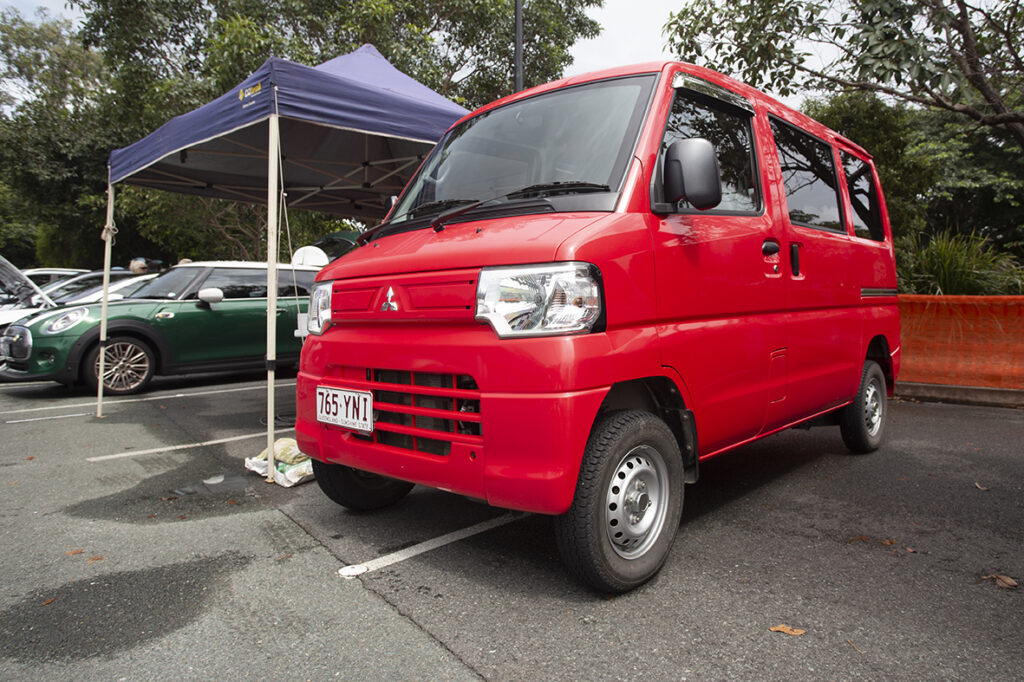
It’s used on his rural property and for town shopping, can apparently go 120km/h on the motorway “comfortably” and is ideal for transporting anything from bales of hay to Chris’ mountain bike or kayak. Look out for a full story on this vehicle soon.
While showers barely dampened enthusiasm for the event, it appears Noosa’s local EV charging stations didn’t cover themselves in glory. One EV driver reported both of Noosa’s 50kW charge points weren’t working when he tried to recharge on the day of the Expo.
Once again it appears the people are ready and willing to embrace electric vehicle ownership, but infrastructure, if it’s in place at all, has much room for improvement to better service drivers.

